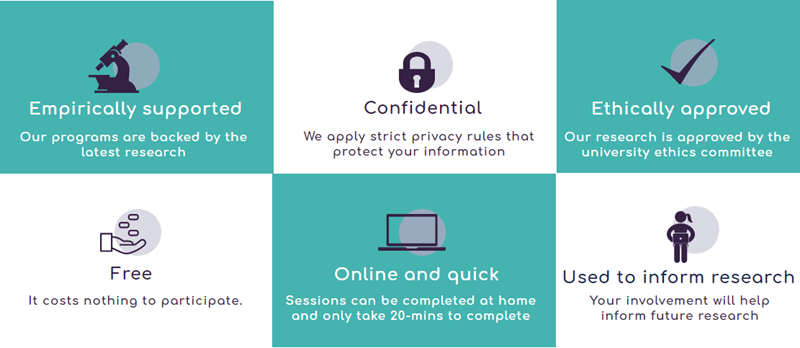What is the Re-Train Your Brain study about?
What is the study about?
Many people experience anxiety and alcohol use disorders.
Most treatments that currently exist seek to change anxiety and alcohol use do so by targeting unhealthy thoughts that people are consciously aware of (e.g. by treatments such as Cognitive Behavioural Therapy). However, many people indicate that their anxiety and alcohol consumption is not always a conscious choice. Supporting this, there is accumulating evidence which suggests that another factor that contributes to the development and maintenance of these disorders is "cognitive biases", or unconscious mental habits.
Among several others, there are two common types of cognitive biases that are associated with anxiety and hazardous drinking: 1) an alcohol “approach bias” and 2) an anxiety “interpretation bias”.
An 'approach approach bias' refers to the way in which we are automatically drawn to approach or seek things we find rewarding when we encounter signals (like sights, sounds, smells, or places) that remind us of those things. When people use alcohol frequently, they often develop an approach bias related to alcohol, so that sights (like seeing alcohol-related paraphernalia or people they have been out drinking with), places they have used alcohol, or other signals automatically spur their desire to approach or seek alcohol… and then drink it.
An approach bias can be triggered very quickly, and often functions at a somewhat subconscious level, so people aren’t even fully aware they’re being influenced by it. This can make drinking very difficult to control.
An 'anxiety interpretation bias' is the tendency to analyse ambiguous stimuli, scenarios and events in a negative or catastrophic manner. For example, a situation in which one friend walks past another without acknowledgement. The individual may interpret this behaviour to mean that their friend is angry with them. Or a situation where someone is giving a presentation and one of the audience members yawns. The individual may negatively (and most often incorrectly) interpret the yawn as indicating boredom rather than a poor night’s sleep.
Sometimes it can be difficult to tell whether something that happens is good or bad. Our tendency to interpret these ambiguous events as positive or negative can happen very rapidly and even without our being aware of our interpretation, so it can be difficult to catch these thinking habits — even though a tendency to routinely interpret things in negative ways can make us feel more anxious or sad.
This is where the current study might help! Thankfully, scientific research has shown that these subconscious, automatic thoughts and behaviours can be changed via brain training tasks, known as Cognitive Bias Modification (to learn more about the intervention, please see the What’s the Science Behind the Program page).
This project aims to evaluate the feasibility, acceptability and preliminary efficacy of an evidence-based, anxiety and alcohol brain training program that will re-train these subconscious, automatic tendencies, via Cognitive Bias Modification.
The program combines two types of Cognitive Bias Modification programs; one primarily for anxiety and another for alcohol use.
- The alcohol program will focus on changing participants’ approach bias.
- The anxiety program will focus on changing participants’ interpretation bias
Based on feedback from health professionals and young people with lived experience of anxiety and drinking problems, we merged these two types of programs into a hybrid intervention for young Australians aged 18-30 years who experience both of these conditions. The program will be added as an adjunct to standard in-clinic treatments and will be delivered via the internet to increase convenience and flexibility.
How can the Re-Train Your Brain program help?
The Re-Train Your Brain program is designed to help with anxiety and drinking. It is:

By using a computer task that directly modifies unconscious tendencies and mental habits, we hope the Re-Train Your Brain program will give young people the mental strength and skills to manage anxiety and make it easier for young people to resist the temptation to drink alcohol, especially if they are using alcohol to manage anxiety.
As part of this study, we expect the initial online survey and cognitive assessment will take up to 45-50 minutes (combined) to complete. You will receive a $30 e-gift voucher after completing both tasks.
The brain training sessions will take 15-20 minutes per session, and they are to be completed twice per week for 5 weeks. In addition, all participants will be asked to complete a weekly 5-minute assessment of their anxiety and alcohol use, with a $5 Prezzee e-gift voucher per completion (10 total). An accumulated voucher will be paid at the end of the treatment period (maximum $50 voucher). The 6-week and 3-month follow-up surveys and cognitive games are also anticipated to take 45-50 minutes to complete at each time point. As a thank you for your time and involvement in our research, will provide you a $30 e-gift card for each of these follow-up time points after you complete both tasks.
If you would like to start the survey, please click the ‘Start Survey Now’ button below to register
Start survey
Who is behind the Re-Train Your Brain program?
Researchers from the University of Sydney are creating the Re-Train Your Brain program, with expertise provided by national and international collaborators from Monash University (Melbourne), the University of New South Wales (Sydney), the University of Amsterdam (The Netherlands), Utrecht University (The Netherlands) and the University of Virginia (USA). The study has been approved by the University of Sydney Human Research Ethics Committee (HREC#2020/135).
To learn more about the study and what it involves, please go to the Information & Consent page.
For any questions, please contact the Chief Investigator (Dr Katrina Prior).